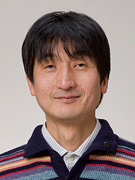Course of
Linguistics and Literature
Professor SUGIYAMA Kinya (Japanese Language and Literature)
| [Theme] | The Boundaries of "Modern Japanese Literature" |
|---|

My name is Kinya Sugiyama, and I teach modern Japanese literature in the School of Humanities. I graduated from college in 1992, and came here in 2009. I specialize in the works of Yukio Mishima and the relationship between literature and media.
I don't, however, really understand what "modern Japanese literature," is, which puts me in a tight spot [laugh]. The phrase "modern Japanese literature" can be divided into "modern," "Japanese," and "literature," but I can't help but think that the boundaries of the fields indicated by these words are vague. For example, I don't really know if the "modern" in "Japanese" "literature" begins with the Meiji Restoration, or after it ended. It seems to me that early Meiji literature should be tacked on to late Tokugawa literature and called "19th century literature." The end of "modern literature" is taken as the beginning of "contemporary literature," but I don't really know if "contemporary literature" is supposed to be a part of, or distinct from "modern literature."
Next is "literature," but I don't know what the boundaries of literature are. At Kanazawa University, "literature" cohabits with "language studies" and is a neighbor of subjects like "history" and "psychology," but if we assume that Japanese pop or movie screenplays are "literature," then literature should cohabit with "music" and "image." Science fiction is a cohabitation of "literature" and "science." The boundaries between "what is literature" and what is not "literature," and between "pure literature" and "popular literature," are rather blurred.
Finally, let's consider "Japan." If you open an atlas, the boundaries of "Japan" are clearly visible. But in fact, the boundaries of "modern Japan" have expanded and contracted depending on the period. Is the literature that arose in such frontier regions "modern Japanese literature"? For example, the writer Chang Hyok-ju learned Japanese in a Korean peninsula under Japanese rule, and published literary works in Japanese. After the war, he acquired Japanese citizenship and wrote books under the name Kakuchu Noguchi. Another writer, Hideo Levy, was born in the United States of a Jewish-American father and a Polish immigrant mother, and writes novels in Japanese. Aren't the works of these writers part of "modern Japanese literature"? One could argue that whatever the nationality of the writer may be, the above works written in Japanese are "Japanese literature." The "Shirakaba" cofounder of Torahiko Kori, on the other hand, went to England, wrote plays and reviews in English, and attracted attention of the people of that country. Even when he published works in Japanese magazines, he wrote in English and translated the works into Japanese himself. These works, at least, are not "Japanese literature."
Thus, the boundaries of the field indicated by the words "modern Japanese literature" are more than a little vague, and give a feeling of being a hodgepodge with no clear limits. Even not knowing what something is, if it appears to be a delicacy, I will eat it everyday, but to know ahead of time what I'm putting into my mouth causes leads to a lot of confusion in my head.

